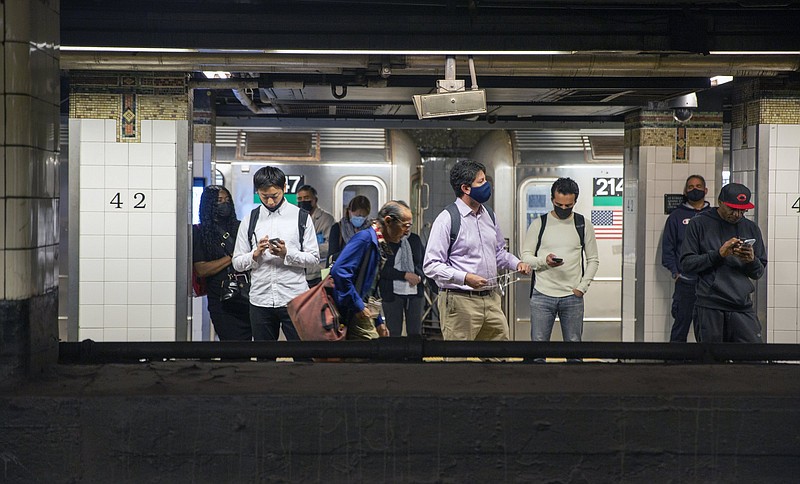In Houston, the public transportation system is offering new bus drivers bonuses of $4,000. For mechanics, it's $8,000. In St. Louis, bus service has been cut by more than 10%.
In New York, transportation officials are trying to lure retired subway operators back to their old jobs. There just aren't enough workers to keep these systems running.
Labor shortages are plaguing public transportation systems in nearly every big city, disrupting one of the critical support systems of modern urban life and complicating the recovery of an industry that has struggled mightily during the pandemic. This is raising new challenges for many cities, which have already been battered from the pandemic.
"I would characterize us in the midst of a labor crisis," said Taulby Roach, president of Bi-State Development, a nonprofit that runs St. Louis's public transportation system, Metro Transit. "There's no question."
The system is short about 150 positions, out of about 1,400 to 1,500 front-line employees total, Taulby said -- about 10%.
It is yet another sign of how deep the disruption to the labor market remains, nearly two years into the pandemic.
Complaints about the labor shortage have been loudest in industries with grueling and often low-wage work, including fast-food restaurants and hospitality. But the persistence of shortages in a field like public transportation shows the depth of complications for the labor market: Even some stable and well-paying jobs are no longer desirable to many workers, for a complicated range of reasons.
And a shortage of transportation workers can have ripple effects across a number of other fields. When bus routes are curtailed or trains run less frequently, it can disrupt the efforts of other workers to commute. And if costs go up to recruit more employees, riders could face higher fees.
Transit officials across the country described the issue as twofold: On one hand, there is now fierce competition for workers with commercial driver's licenses, the standard needed to drive buses in most municipalities in the country, as agencies compete with delivery services like FedEx, UPS and Amazon for workers. And on the other, attrition rates have skyrocketed, as burned-out transit workers have left for other jobs or early retirements. (Amazon founder Jeff Bezos owns The Washington Post.)
The bus-dominated St. Louis system has had to reduce service about 10 to 12% to cope with the gap, reducing the frequency of some routes and eliminating a few express options outright.
"We have the budget capacity to maintain all of them," Roach said. "But quite frankly, we don't have the operators and it's really impacting service and we're doing everything we can."
EMPLOYEE EXODUS
Attrition rates have been abnormally high. While St. Louis used to lose about seven operators a month, it has been losing between 21 and 25 a month since the early part of this year.
On top of that, hiring has proved challenging, although a $2,000 bonus the agency began offering has helped sweeten the pot.
In Portland, Ore., the region's transit operator, TriMet, cut service by 9% earlier this month because of similar labor woes. Hiring has proved to be the biggest obstacle there.
"Our recruitment numbers haven't been where they needed to be," said Tia York, a spokeswoman for the agency. "We've had weeks where there are just a handful of people in new operating training classes. Before the pandemic, we would hire dozens of people every month."
TriMet, which operates 84 bus routes over a 500-square-mile area, is down about 45 operator positions out of 1,000. Bus operator training is not a rapid endeavor -- it takes seven weeks to get new workers trained, although the program is fully paid.
To combat the problem, the service raised its starting pay $4 an hour in October, to $21.36, but the increase made little difference, York said. A $2,500 bonus it began offering at the end of November has proved more effective, increasing applications fivefold over the course of the first week.
York said the agency didn't fully understand all the causes of the labor issues but knew it was part of a broader movement by some workers away from customer-facing work.
SERVICE CUTS WIDESPREAD
Elsewhere, public transportation service has been affected by labor issues in Los Angeles, Seattle, Austin, Houston, New York City, New Jersey and the Washington, D.C., area, where some bus systems are down by 10% or more in staffing. Riders in Philadelphia and Chicago have made similar complaints.
In states such as Utah, Colorado and Ohio, transportation officials are having trouble finding enough workers to clear the roads after snowstorms. Amtrak has been bracing for potential service cuts, if a substantial number of its employees refuse to be vaccinated against the coronavirus by the company's deadline next Tuesday.
And the surge of cases from the omicron variant could further exacerbate the issue.
Patrick Coomer, 61, a bus operator in Portland for the past nine years, said in an interview that bus-driving jobs had always been high pressure but have only grown more stressful since the pandemic.
Coomer says customers, including some emotionally disturbed people, constantly challenge him about the system's mask mandate. Attacks on operators remain a persistent threat, too, he said.
"It's often only standing room at rush hour, which makes me nervous having to deal with people who don't want to wear masks during a pandemic, not knowing who's been vaccinated and who hasn't," he said. "There's also frustration from riders who think you're late, but you're right on time, if maybe the bus ... ahead of me got canceled. We're always faced with challenges, and now we're facing new ones."
